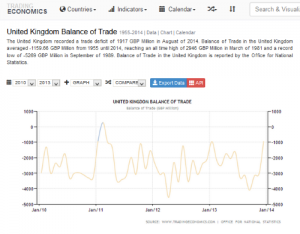I walked down to the People’s Museum where Unions 21 were hosting a series of meetings, the one I was planning to attend was about policy for the encouragement of SMEs in the creative industries and had been convened by the entertainment unions, the Musicians Union, Equity and BECTU, (Broadcasting Entertainment Cinematograph and Theatre Union) each represented by their General Secretaries. The meeting was opened by Helen Goodman, Labour’s shadow spokesperson on Culture Media and Sport.She opened with the mandatory eulogy to the attendees, that we have the most successful creative industry in the world. I really must dig through my Steve Bell cartoons and find the one where he says the Britain has the best used kebabs in world, together with the best policemen and best journalists.
She also stated that the creative industries generated a balance of payments surplus. Interesting, again a case of being careless with the actualité. At last year’s Conference in a meeting hosted by UK Music and covered by me on this blog here, they presented the research as the UK being the 3rd largest exporter, after the USA and Sweden. I met the researcher who had conducted it and he did not know what the import rates were. Furthermore, given the right wing bias of the press we are used to hearing ad-nauseam that the UK has a large fiscal deficit; they speak far less about the fact that we are running an even larger foreign trade deficit. If Music, Film and Theatre are exporting more than we import, I’d be very surprised, and I think we would have heard of it before now. Possibly Cliff Richards, that well known union member’s royalty earnings from the USA are larger than I thought.

There is some evidence that the performance of the performing arts, (although this includes book publishing) has outperformed the economy as whole, but it would need to be exceptional for the performing arts balance of trade to be positive.
She then turned to safer ground, talking about access to the work and supporting the Union’s campaigns for a right to be paid for what you do but linking it to stronger intellectual property laws, which as I have said before, I am not sure how you could make them stronger. They are developing an interesting slogan, “Work not Play”, which raises questions about entry again. She rightly challenged the existence of unpaid internships wound up with an attack on the Tory curriculum reforms that have relegated the arts and performing arts to bit parts as they make a fetish of science and money in a philistine attempt, doomed to failure, to rectify a short term skills gap. We should note that tripling of tuition fees is also part of the attack on access to a cultural education. She finished by stating that Labour’s proposed British Investment Bank will make funds available to creative industry enterprises and projects.
Helen was followed by John Smith, the General Secretary of the Musicians Union. He opened his speech with a welcoming of Helen’s comments on stronger intellectual property laws; they don’t seem to realise that the music majors, now they have to pay for the Digital Economy Act, don’t want it. The music majors, and there are only three of them, have moved on; they now want to regulate the search engines and DNS providers. I have some notes that he spoke of the Union supporting continuing professional development and have intervened in the courts around competition law. I’d like to say more but my notes aren’t good enough. (One problem is that the speakers, spoke quickly and so my note taking wasn’t fast enough, on the other hand it could just be that he was being boring.)
Smith was followed by Gary Morrissey of BECTU, with an impressive policy laden speech and a good problem analysis. I was interested to hear him say that the Government, and he named Osborne has helped the arts and plans to continue to do so. Having said that, they wound up the British Film Council in their bonfire of the quangos; and I can’t believe that Sajid Javid & Maria Miller’s speeches on the economic value of arts helps. He spoke about the casualisation of work in the industry, and the increasing disintegration of the supply chain. He spoke of the growth of freelancing and use of contract supply, something we are used to in the IT industry and its consequential weakening of the stability of the workforce and hence the power of the unions’ membership. These trends led to a loss of control of hours worked as the employment contracts are marketised. The hours worked in film production are excessive and often breach the EU working time directive, which of course there’s a UK exemption and you don’t get the job if you don’t agree the terms. The desire for cheaper labour is the drivers for the disintegration & out-sourcing of the supply chain; once work is supplied through service company contracts the principal has no compliance responsibility. Smith had spoken of his Union’s legal interventions in ensuring that employers and employer association keep to their legal commitments.
Onto the economics, he pointed out that the film industry is geographically concentrated with little regional employment. This insight made me wonder what the gini co-efficient for the creative industries is. He made the point that regional theatre is dying, weakened possibly by the reinforcing cycle of film, TV and theatre. (He didn’t mention books, which remain an important source of creative content for the rest of the creative industries. I hadn’t realised how economically important until I looked at the Arts Council commissioned report. See below.)
He then turned to policy remediation; he turned first to the BBC and called for a security of income for the BBC to remove the fear from their policy. The Tories are decriminalising non-payment of the licence fee and the persistant back bench attacks on the supposed bias is a deliberate act of intimidation. They have put a squeeze on the BBC income and the news editorial policy today seems more craven than any time I have known it. Morrissey accused the BBC of planning to withdraw from direct production (of drama). Labour’s leadership are playing with alternative funding schemes for the BBC and reuse of the licence (as in the original text of the Digital Economy Bill). There is little doubt that the BBC leadership and news room has lost the trust of the political class, and this must be stopped. A commitment to the BBC through the licence fee will remove the fear and importantly keep the public collectively invested in content creation. Public policy needs to reset the fee, give the BBC confidence that it can continue in its mission to inform the public, create great content and run an impartial news room.
Morrissey’s remaining suggestions are easier to explain. He argues that the next Labour Government needs to make arts expenditure a local authority statutory duty. (Really? While I believe that its good public policy, it can’t be done without a resettlement of the rate support grant. Local Authorities will be cutting care budgets over the next couple of years.) He finally argued that the Arts Council budget should be restored.
A senior representative of Equity, the actors union spoke. He started with the assertion that the local multiplier for arts budget expenditure was eight times expense. This would be massive if true, and substantiated it with a story about Keswick theatre car park. Later I asked for the source of this and I was pointed at the Arts Council web site and a commissioned report by the CEBR, “The contribution of the arts and culture to the national economy”. This report as far as I can tell, suggests that the economic gross value add of the creative sector is ~2.5 times inputs. (This may evaluate as eight times the public subsidy, but I don’t think the calculation is valid; I do think that a 2.5 multiplier is high as we expect a 1.2 from capital projects.) The point that for actors this is work not play was repeated.
Traditional responses and the enforcement of collective bargaining is difficult because of the transient nature of work in the industry. It should be noted that this makes mandatory ballots very difficult to organise; creating a list of valid participants is hard due to the rate of turnover of members and employees. One key public policy response is that any subsidy or public money needs to be linked to good citizenship on issues such as wages, hours, and tax payment.
All three union speakers mentioned access to the industry, the Equity speaker stating that Equity is 50%/50% gender split, but that roles are not. This dimension of access is hard to address through public policy, and is a substantive piece of evidence around the inequity of “every day” sexism. At last year’s conference, the meeting I attended was concerned about racial minority access to work in the industry and at least one of the goals of any educational curriculum reform, which requires an industry response is to reduce the impact of nepotism. The role of unpaid internships has been mentioned already at the meeting since they are another of the barriers to entry to the industry.
I asked if the response was to roll back the Thatcher TU laws, to place the balance of recognition back in the Unions, I also asked for substantiation of the multiplier, and on the questions of copyright durations I asked again, as I had last year, if they’d swap duration for consent.
Morrissey handled the Trade Union law part of the question. He doesn’t see it happening and talked about the casualization of the industry, the employee turnover in the industry all making it hard to organise ballots and strike action.
The answer to the question on the multiplier was to look at the Arts Council site. (See above).
In the case of copyright duration, Smith accepted that it’s probably too long, he’d be prepared to reduce it to author’s life time. The problem, as ever, is the hard cases. Composers and songwriters can’t necessarily perform their works; it’s doesn’t in my mind guarantee them the right to charge for everything for ever.
ooOOOoo
I spoke to John Smith after the meeting to ask why if as James Boyle suggests that copyright is worth little after 14 years he is determined to keep it, it seems that everyone has research, and when I tried to quote Fergal Sharkey that Musicians earn less than the average wage so that pursuit of earnings through royalty fees is failing, I was told I was making it up. I didn’t have time to quote my sources in the latter case.
